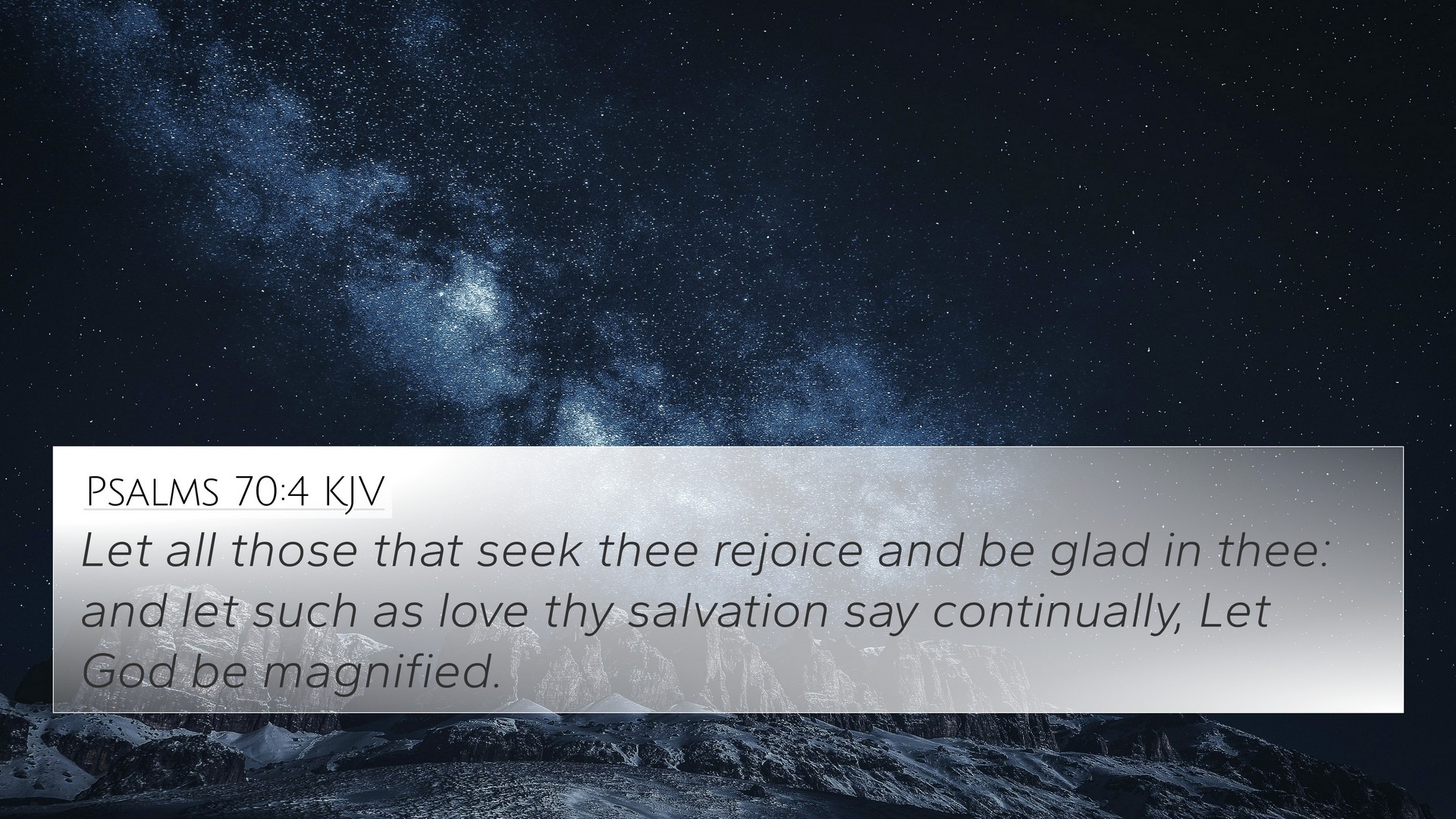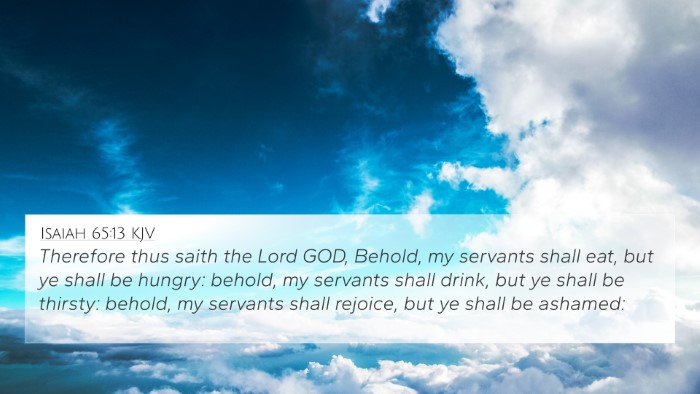Understanding Psalms 70:4
Psalms 70:4 reads:
"Let all those that seek Thee rejoice and be glad in Thee: and let such as love Thy salvation say continually, Let God be magnified."
Summary of Biblical Insight
This verse serves as a passionate plea to God, echoing the psalmist's desire for divine intervention. It reflects the themes of joy, salvation, and the glorification of God, encouraging those who seek Him to rejoice actively. In a time of distress, the psalmist finds solace in the idea that those who love God’s salvation will always praise Him.
Commentary Insights
-
Matthew Henry:
Henry notes that this verse highlights the joy experienced by those who turn to God for help. The call to rejoice is not merely a suggestion but an essential reaction for believers. It puts emphasis on the collective joy that comes from seeking God and the importance of acknowledging His greatness.
-
Albert Barnes:
Barnes explains that the act of seeking God inherently leads to rejoicing in His salvation. He illustrates that true love for God's saving grace naturally results in a desire to proclaim His greatness, thus advising believers to focus their praises towards God continually.
-
Adam Clarke:
Clarke deepens the understanding by connecting this verse with the overall theme of dependence on God. He points out that 'magnifying God' is a declaration of faith, indicating an acknowledgment of God’s preeminence and a recognition of His power in the lives of believers.
Related Bible Cross-References
This verse connects with several other passages that echo similar themes of seeking God, joy, and magnifying His name. Here are some notable cross-references:
- Psalm 34:3: "O magnify the Lord with me, and let us exalt his name together."
- Psalm 63:1: "O God, thou art my God; early will I seek thee: my soul thirsteth for thee, my flesh longeth for thee in a dry and thirsty land, where no water is."
- 1 Chronicles 16:10: "Glory ye in his holy name: let the heart of them rejoice that seek the Lord."
- Philippians 4:4: "Rejoice in the Lord always: and again I say, Rejoice."
- Isaiah 25:9: "And it shall be said in that day, Lo, this is our God; we have waited for him, and he will save us: this is the Lord; we have waited for him, we will be glad and rejoice in his salvation."
- Acts 16:25: "And at midnight Paul and Silas prayed, and sang praises unto God: and the prisoners heard them."
- Revelation 19:7: "Let us be glad and rejoice, and give honor to him: for the marriage of the Lamb is come, and his wife hath made herself ready."
Connecting Themes and Insights
The verse from Psalms engages readers in a reflective exercise about the essential characteristics of the faithful. Here are some themes to consider:
- Joy in Seeking God: Just as illustrated in Psalms 70:4, seeking God leads to joy, as emphasized throughout scripture.
- Greather Magnification of God: The act of magnifying God is a pivotal theme; Psalms 34:3 and other verses illustrate collective worship as a means to exalt Him.
- Rejoicing in Salvation: The links between the psalmist's expressions of joy and the concept of salvation reflect a consistent biblical narrative from the Old to the New Testament.
- Call to Worship: Verses like Philippians 4:4 underline a continuous call to praise and worship God in all circumstances.
Conclusion
Psalms 70:4 encapsulates a profound truth about seeking God and expressing joy in His salvation. It invites believers to constantly acknowledge God’s greatness. As believers engage with this text, they are reminded of the ongoing inter-Biblical dialogue that links such exhortations across various passages, encouraging a deeper understanding through comparative Bible verse analysis and thematic explorations.
Tools for Further Study
For those interested in enhancing their understanding of theological themes and exploring cross-references, consider utilizing:
- Bible Concordance: A great tool to identify connections between Bible verses.
- Bible Cross-reference Guide: Provides insights into how various scriptures relate.
- Bible Reference Resources: A comprehensive list of texts for deeper study.
- Cross-reference Bible Study Methods: Techniques for exploring intertextual themes.










